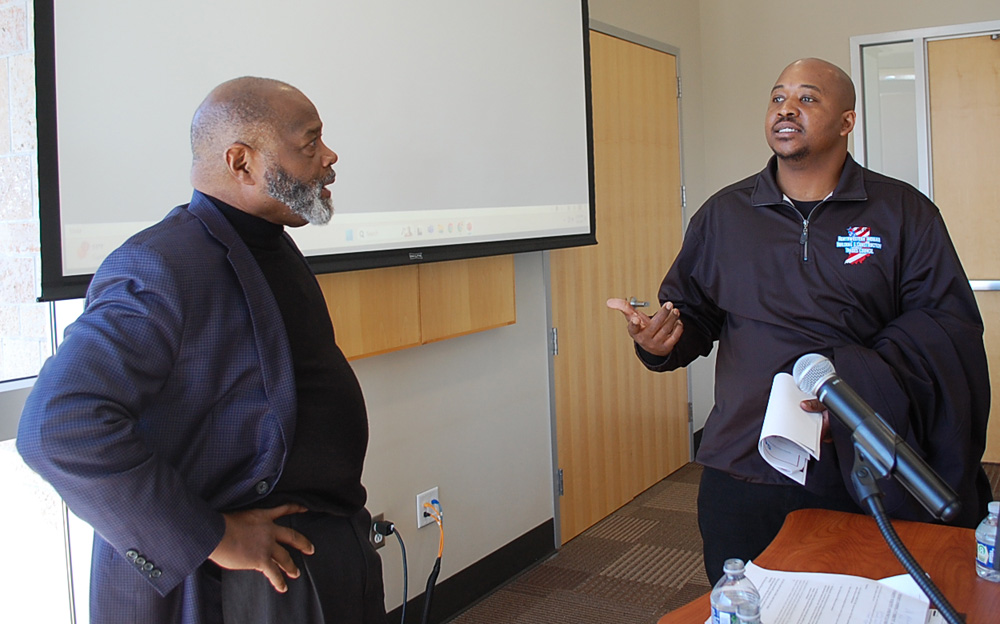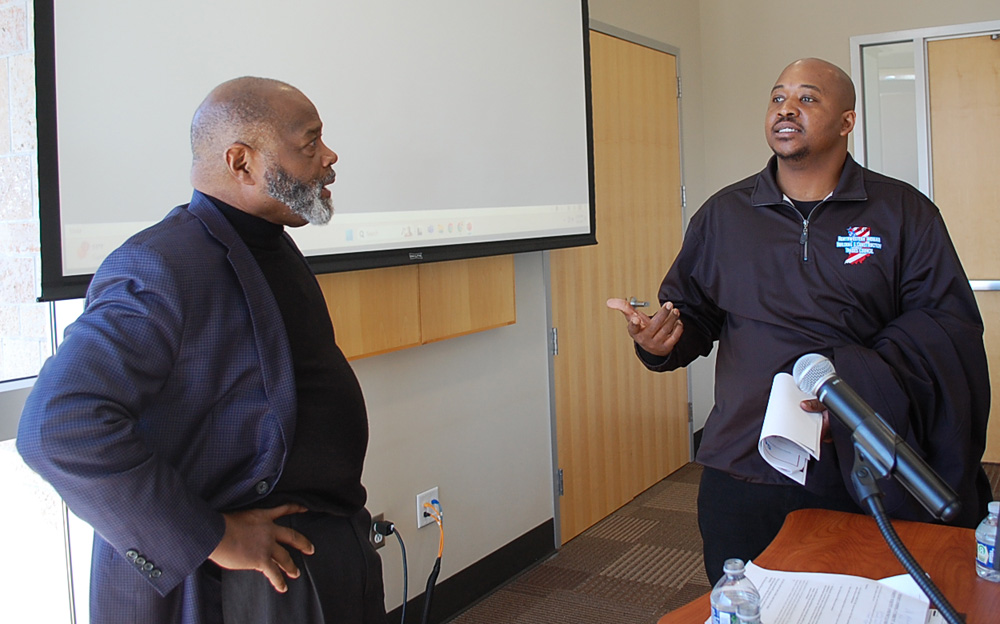
Professor Kevin Brown, left, and Emmanuel Turner, Area Director of the Indiana Plan Construction Training Program at Urban League’s DEI symposium
All is on the table at Diversity, Equity & Inclusion symposium
Contributed By: The 411 News
Urban League of Northwest Indiana looks at 'where DEI is now and how it will look in the future'
Now officially banned in federal government by President Trump, the practice of DEI (Diversity, Equity & Inclusion) has become in some of his supporters’ views an object of derision and a slur word.
Supreme Court Justice Amy Coney Barrett was called a “DEI hire” by Trump supporters when she voted against the Trump administration in the recent ruling related to paying foreign aid organizations for work they had performed. Trump had stopped those payments soon after his inauguration. Trump appointed Barrett to the Court in his first term.
Indiana Governor Mike Braun made its elimination a hallmark of his first days in office with Executive Order 25-14, replacing DEI with MEI – Merit, Excellence & Innovation.
Critics of diversity, equity and inclusion lock in on race in the workplace, saying DEI promotes preferential treatment for minorities in hiring and job advancement.
All of that was on the table at the recent Urban League of Northwest Indiana Symposium “What is DEI and What Is Not?” held at Valparaiso University’s Harre Union, with a session limited to high school students and breakout sessions for adults.
Expansion of DEI policies after 2003 led to the anti-DEI movement we see today, University of South Carolina law professor Kevin Brown explained in his session ‘Understanding Current Attacks on Diversity, Equity & Inclusion.’
There was the U.S. Supreme Court decision in 2003 to allow the use of race as a factor in college admissions. In 2015, the Court legalized same sex marriages.
Also, the 2000s saw the social justice movements asking for diversity in the workplace, recognition of gender identity and representation, and the acceptance of multiculturalism. In 2020, George Floyd protests asked for an end to police brutality and systemic racism against blacks.
“Five developments impacted DEI and the most important was the 2023 Supreme Court decision rejecting affirmative action in Students for Fair Admissions v. Harvard,” Brown said. “The court had approved affirmative action on race in their 2003 decision and rejected it in 2023, altogether.”
The Supreme Court said racial preferences will not be allowed in higher education. Chief Justice Roberts wrote, "Eliminating racial discrimination means eliminating all of it."
Brown said the end of affirmative action in the Harvard decision led the way for others to roll back their diversity initiatives. Among his 5 developments, Brown included Indiana’s Senate Bill 289 which is under consideration in the current legislative session and wants to make Gov. Braun’s executive order a state law.
Since the Harvard decision, Brown said HBCUs (Historically Black Colleges and Universities) saw huge increases in applications. “For the last 30 years I was at Indiana University’s Maurer School of Law, we were bringing in from 10 to 20 black students a year. Last year, they only brought in one.” Not just students are being affected, Brown said, it will also impact professors.
“We’re going to see a tremendous hit on Black and Latinx professionals in medicine, law, accounting, engineering, and the STEM fields,” Brown said. “Those opportunities aren’t going to exist as much.”

Professor Kevin Brown, left, and Emmanuel Turner, Area Director of the Indiana Plan Construction Training Program. Turner said entry into union construction jobs had been difficult for Blacks. Times have changed, he said, and unions are now more open to hiring Black candidates.
In another breakout session, Strack & Van Til Foods and Crossroads YMCA told how they got started with the Urban League and how they implemented DEI in their organizations.
Efren Garcia, Strack & Van Til’s Human Resources Manager kicked off the session with a short video of the Urban League’s Dr. Vanessa Allen-McCloud that’s played at all Strack orientations.
But he went back, to 2017.
“Morale was low and people felt unappreciated,” Garcia said, “even though Jeff Strack had just saved the company from a takeover, saving all our jobs. Jeff knew he needed to do something.”
Results of a survey, that employees answered anonymously, to determine the culture at Strack led to the start of a diversity council. The survey went to all employees, from baggers to managers to the executive team.
“We thought we knew what we were doing. We thought we had the answers,” Garcia said. “The conversations we were having were very difficult. A lot of us weren’t comfortable enough to bring certain items to light. We weren’t honest with each other on some topics.”
“That’s when Derek Kinney, our human resources vice president partnered with Dr. McCloud. She came to our meetings to help get that out of us,” Garcia said.
The wave of George Floyd protests in 2020 rippled into the diversity council. Garcia recalled the frustration of a store employee who had the responsibility of protecting the store from potential harm by protesters also believed in the protesters’ cause.
“In light of how he felt, I think that was the turning point for our council, when a lot of us started to really dig in deeper and really bring out how we felt about certain situations,” he said.
The George Floyd protests also became a turning point at Crossroads YMCA.
“Some at the Y wanted us, as an organization to stand for something, to say something, do something,” said Nicole Ochoa, executive assistant to Crossroads YMCA President/CEO Jay Buckmaster.
“We didn’t want to just plaster promises on our windows; we wanted to address these issues within our Y’s and the communities we serve,” Ochoa said. “We started the AEC, the Advancing Equity Committee made up of staff from our 6 branches and our corporate office.”
Their hardest moments came when talking about DEI, Ochoa said. “Every time when you try to talk to someone about DEI, I don’t care their background or where they come from, the first thing they think is race and a lot of time it’s the only thing they think.”
“It’s kind of hard to get people to understand that DEI is not just about race and ethnicity. It’s about classism, food insecurity, disabilities, sexual orientation, and so many things,” Ochoa said.
“But when you look at the flip side, some of our proudest moments are learning to have those hard to have conversations,” Ochoa said.
Story Posted:03/11/2025
|